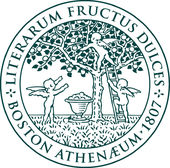
Boston Athenæum
Boston Athenæum
The Boston Athenæum, a membership library, first opened its doors in 1807, and its rich history as a library and cultural institution has been well documented in the annals of Boston’s cultural life. Today, it remains a vibrant and active institution that serves a wide variety of members and scholars. With more than 600,000 titles in its book collection, the Boston Athenæum functions as a public library for many of its members, with a large and distinguished circulating collection, a newspaper and magazine reading room, quiet spaces and rooms for reading and researching, a children’s library, and wireless internet access throughout its building. The Art Department mounts three exhibitions per year in the institution's Norma Jean Calderwood Gallery, rotating selections in the Recent Acquisitions Gallery, and a number of less formal installations in places and cases around the building. The Special Collections resources are world-renowned, and include maps, manuscripts, rare books, and
- 55 minutes 34 secondsAuthor Talk | BREAKING BIAS: Where Stereotypes and Prejudices Come From by Anu GuptaFor readers of Caste, Sapiens, and The Dawn of Everything, join us for a page-turning deep-dive into how bias is learned—plus a strikingly original and highly effective set of tools to un-learn it. Drawing on two decades of original research and experience training thousands of students, Anu Gupta, a lawyer, scientist, and educator whose work focuses on diversity, equity, inclusion, and belonging, has written a comprehensive and compellingly readable guide for anyone who wants to understand and unlearn conscious and unconscious biases.21 November 2024, 12:00 am
- More Episodes? Get the App